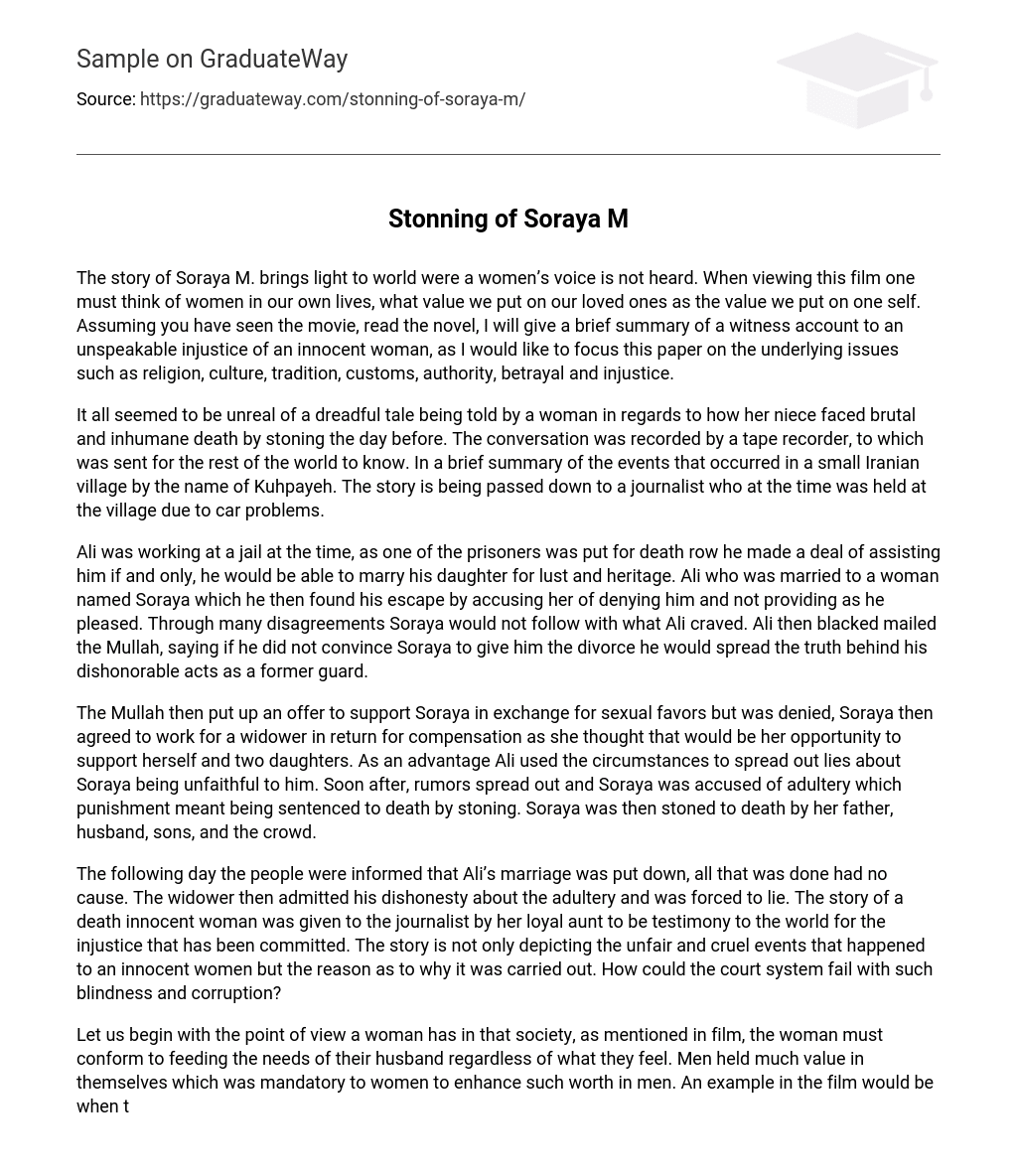Soraya M.’s narrative sheds light on a society that ignores women’s voices, prompting us to contemplate the significance we place on the women in our lives and our own selves. For those familiar with either the film or novel adaptation, I will provide a brief summary of a firsthand testimony recounting an unspeakable act of injustice perpetrated against an innocent woman. The objective of this essay is to focus on the underlying issues pertaining to religion, culture, tradition, customs, authority, betrayal, and injustice.
Describing a horrifying narrative, seemingly narrated by a woman, the tale depicts the tragic stoning of her niece. Recorded on a tape recorder, this conversation was subsequently shared globally. The account provides an overview of incidents occurring in Kuhpayeh, a small village in Iran. It was relayed to the journalist who, stranded due to car difficulties, acquired this story.
While working at a jail, Ali offered to assist a prisoner on death row in exchange for permission to marry his daughter. Despite being married to Soraya, Ali accused her of neglecting his desires and sought an escape by falsely accusing her. As their disagreements intensified, Soraya resisted giving in to Ali’s demands. In order to pressure the Mullah into convincing Soraya to divorce him, Ali threatened to expose his dishonorable actions as a former guard.
Soraya was approached by the Mullah, who proposed that he would provide his support in exchange for sexual favors. However, she declined his advances and instead agreed to work for a widower and receive compensation to sustain herself and her two daughters. Tragically, her husband Ali exploited the situation and disseminated false rumors about her infidelity. These rumors rapidly spread, leading to accusations of adultery against Soraya. The prescribed punishment for this transgression was execution by stoning. Shockingly, Soraya’s own father, husband, sons, as well as a crowd of witnesses participated in the act of stoning her until death.
The public was informed the following day that Ali’s marriage had been annulled unjustifiably. It later became known that the widower had falsely accused his deceased wife of adultery under duress. To bring international attention to this injustice, the victim’s devoted aunt shared her relative’s story with a journalist. This account not only exposes the cruel and unfair treatment of an innocent woman but also sheds light on the underlying motives behind these actions. How could corruption blind the judicial system to such an extent that it miserably fails?
The film highlights the societal expectation for women to prioritize their husband’s needs over their own desires, emphasizing the significant value placed on men and the importance for women to enhance their worth. There is a specific scene where the eldest son disrespects his mother as a means of retaliating against her defiance towards his father. The father’s declaration that “this is a man’s world” has a lasting influence on the boy, molding his future identity.
If he were to reconsider his moral principles and accept his role as a man in that society, he would need to adhere to their beliefs concerning the worth of women, including his own mother. When Soraya communicated that a woman had no value without her husband, it justified her refusal to grant Ali a divorce. She feared losing a stable foundation for supporting her two daughters if Ali left since he only desired to keep their sons. This exploitation of religion and traditions for personal gain has occurred over centuries, leading to the sacrifice of numerous innocent individuals driven by greed and desire.
Soraya mentioned that her father would attend the court hearing and she believed he would conform to societal norms rather than support her. In her youth, she was sold to a man for labor but did not experience intercourse. She did not want this life for her two daughters and asked her aunt to inform them of their mother’s true story so they wouldn’t feel ashamed. Some societies still follow traditional customs and beliefs, which can be seen as respecting ancestors but can also impede progress.
Should public hangings and amputation of thieves’ hands continue to be practiced? How much should we hold on to these ancient methods? In Iran, stoning was once used as a form of capital punishment under the Penal Code. It was imposed for adultery, leading to Soraya’s father publicly disowning her with the statement, “she is no longer my daughter, and I am no longer her father.” Despite multiple unsuccessful attempts to stone her, a woman from the audience argued that the missed rocks proved Soraya’s innocence.
The husband then takes charge and treats her unfairly. The sons are also compelled to do the same, followed by the widower who purposely leaves behind the stones and departs.
A moment that stands out is when Soraya gives her final speech, saying, “you all know me I have been in your homes, we have shared meals, I am your neighbor, I am your daughter, I am your mother, I am your wife. How could you do this to me?”.
At that instant, it reminds me of when Jesus said, “Let any one of you who is without sin be the first to cast a stone at her.” (John 8:7)
People generally lack authority; their decisions are usually influenced by their environment or those in power over them. We must take responsibility for our own choices. To make progress, we must abandon outdated customs.
Think about this: would you treat your mother as shown in the film? There comes a time when we must evaluate how we treat others. Take a moment to ponder on life.





